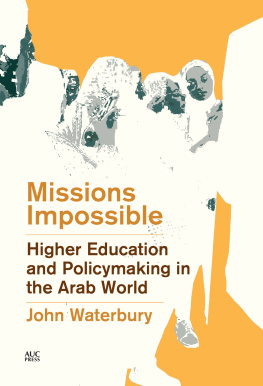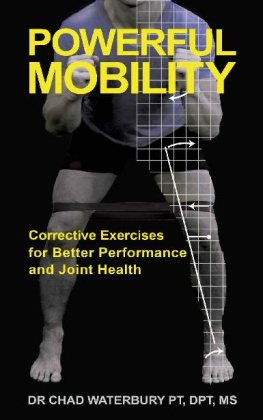Missions
Impossible
Missions Impossible
Higher Education and Policymaking in the Arab World
John Waterbury
First published in 2020 by
The American University in Cairo Press
113 Sharia Kasr el Aini, Cairo, Egypt
One Rockefeller Plaza, New York, NY 10020
www.aucpress.com
Copyright 2020 by John Waterbury
All rights reserved. No part of this publication may be reproduced, stored in a retrieval system, or transmitted in any form or by any means, electronic, mechanical, photocopying, recording, or otherwise, without the prior written permission of the publisher.
An earlier version of appeared as Governance of Arab Universities: Why Does It Matter?, in Adnan Badran, Elias Baydoun, and John Hillman, eds., Universities in Arab Countries: An Urgent Need for Change (Switzerland: Springer, 2018), 5570. Reproduced by permission.
An earlier version of appeared as Reform of Higher Education in the Arab World, in Elias Baydoun and John Hillman, eds., Major Challenges Facing Higher Education in the Arab World: Quality Assurance and Relevance (Switzerland: Springer, 2019), 13366. Reproduced by permission.
Dar el Kutub No. 11150/19
ISBN 978 977 416 963 2
Dar el Kutub Cataloging-in-Publication Data
Waterbury, John
Missions Impossible: Higher Education and Policymaking in the Arab World / John Waterbury.Cairo: The American University in Cairo Press, 2020
p.cm.
ISBN 978 977 416 963 2
1.Education, HigherArab countries
2.Universities and CollegesArab countries
1 2 3 4 524 23 22 21 20
Designed by Sally Boylan
Printed in the United States of America
To Sarah, tqm
Figures and Tables
Figures
Levels of Satisfaction with Aspects of Education
National Study of Undergraduate Teaching in Palestine
Youth Bulge among Arab League Member States, 2016
Net Enrollment Rates for Lebanon and Jordan in Tertiary Education
Distribution of Arab Students by Level, 2008
Distribution of Arab Students by Broad Disciplinary Categories
Number of Tertiary Students per 100,000 Citizens, Arab World
Morocco: World Bank Commitments by Fiscal Year
Political Instability is Most Commonly Chosen as Top Obstacle by MENA Surveyed Firms
The Proportion of Firms Reporting an Inadequately Educated Workforce as a Severe Constraint
The Academic Ratchet
Percentage of University Presidents Who Are Women
Arab Professors: Mostly Missing from the Middle Class
Tables
Arab Barometer Survey
Policy Parameters
Higher Education Statistics in the Arab Region, 2011
Tertiary Enrollments in the MENA, 20002015
Gross Enrollment Ratios, MENA plus Turkey, 2005 and 2015
Tertiary GERs for Turkey
Number of Tertiary-level Graduates, 20042015, Select Countries
Number of Professors in Higher Education, MENA plus Turkey
Desired Employment Sector, 20122013
Index Numbers of Current Public Expenditures on Higher Education
Government Expenditure on Education
Military Expenditure by Country as a Percentage of GDP
Unemployment and Labor Participation Rates, 20092016
People with Higher Education in the MENA Hold Stronger Beliefs about the Importance of Democracy
GERD and Full-time Researchers per Million Population
Global Innovation Ranks
Quality of BusinessUniversity Relations
Nature and Impact of Innovations in Higher Education
Higher Education Outlays per Student, ca. 2005
Revenues and Expenditures, Lebanese University, 2007
Average Presidential Tenure, Select Universities, 2018
Projected Population in the Age Group 1824 in Arab Countries
Projected GERs for Egypt and Jordan
Projected GERs for Lebanon and Morocco
Projected GERs for Syria
Estimated College-going Population under Assumption I
Estimated College-going Population under Assumption II
Estimated College-going Population under Assumption III
Consolidated Table of Three Sets of Assumptions Concerning Increase in GERs
Preface:
Brainstorming Arab Higher Education
H igher education in the Middle East in general, and in the Arab world in particular, is not understudied but, as the references for this monograph show, a lot of the empirical work has been carried out by the international donor community, specialized United Nations and regional organizations, and nongovernmental organizations. Regional governments have undertaken periodic strategic plans, but how seriously they are taken is a matter of debate. The reference section of this book is also testimony to a burgeoning literature on education that is generated by scholars in the region.
My interest in this subject was nourished by my decade as president of the American University of Beirut (19982008), when I had to wrestle not only with the challenges of providing high-quality education in a relatively low-income region but also with those of being a player of sorts in the regional arena of higher education more generally. After the American University of Beirut (AUB) I was for a year advisor to the Government of Abu Dhabi on higher education (20112012). In that capacity I carried out an extensive survey of institutions of higher learning in the United Arab Emirates. To the best of my knowledge that survey was never released. I mention this merely to indicate that while I will pay little attention to higher education in the oil-rich countries of the Arab world, I am not unfamiliar with it.
In my academic career, I have been a student of politics and public policy in the Middle East since the early 1960s. I have also been part of some notable universities: Columbia, Michigan, Aix-Marseilles III, Princeton, AUB, and New York University Abu Dhabi. Like many of my colleagues I lived in the academic environment without studying it. My fieldwork in several countries inevitably led me to local universities, but I went to them in search of expertise. I never studied them in their own right, which, in retrospect, seems embarrassingly short-sighted.
A premise of this study, so widely held that I doubt it would arouse any dissent, is that Arab higher education has been and remains in a state of structural crisis. This has been documented at fairly high altitude since 2002 in various Arab Human Development Reports, especially those of 2003 on Building a Knowledge Society and 2009 on Toward Productive Intercommunication for Knowledge. Surveying all levels of education, the World Bank study of 2008, The Road Not Traveled: Education Reform in the Middle East and North Africa, is equally critical. Finally, the most focused study, although gentler in its critique, is Munir Bashshurs 2004 Higher Education in the Arab States.
As I shall examine in what follows, there may be nothing peculiarly Arab about this crisis. I suspect that many developing countries that committed themselves to democratizing higher education find themselves in similar situations. Indeed, it came as something of a surprise to me that there are no problems in higher education unique to the Middle East and North Africa region or even to developing countries. The problems Arab universities face and the pathologies with which they grapple differ in degree but not in kind from those in other countries. Let me mention just a few here:








